人教七上英语:Unit 5 Do you have a soccer ball教案
人教版英语七上 U5 Do you have a soccer ball 讲义

Unit5 Do you have a soccer ball?一、重点词汇及拓展1. have v.(1) 有e.g. I have a pen. 我有一只钢笔。
(2) 吃;喝e.g. I have breakfast every day. 我每天吃早饭。
(3) 经历e.g. have a good time 玩得开心;过得愉快(4) 上课e.g. We have English lessons every day. 我们每天上英语课。
(5) 举办e.g. Mark has a party. 马克举办了一个派对。
(6) 得…病e.g. He has a cold and a headache. 他感冒和头疼。
2. let v.允许;让let’s = let us 让我们let sb. do sth. 让某人做某事let sb. not do sth. 让某人不要做某事e.g. Let’s have a party tonight! 让我们今晚举办一个派对吧!make sb. do sth. 使某人做某事e.g. The movie makes me miss my mother. 这部电影使我怀念我的妈妈。
3. go v.去;走go to +地点去某地go to school 去学校go here/there/home 去这儿/去那/回家go shopping 去购物go swimming 去游泳go hiking 去远足go skating 去轮滑go boating 去划船4. lateadj. 迟的;晚的be late for school 上学迟到be late for class 上课迟到1be late for work 上班迟到adv. 迟地;晚地later adv. 后来;以后e.g. Three days later, he found his father. (句中有段时间+later,句子用一般过去时)三天后,他找到了他的爸爸。
Unit 5 Do you have a soccer ball 知识点归纳-七年级上册英语

人教版新目标七上英语单元知识点归纳Unit 5 Do you have a soccer ball?重点词汇tennis/'tenis/ n. 网球bat /bæt/ n. 球棒;球拍soccer ball (英式)足球volleyball/'vɔlibɔ:l/ n. 排球basketball/'ba:skitbɔ:l/ n. 篮球late/leit/ adj. 迟到great/greit/ adj. 美妙的;伟大的play/plei/ v. 参加(比赛或运动);玩耍sound/saund/ v. 听起来好像interesting/'intrəstiŋ/ adj. 有趣的boring/'bɔ:riŋ/ adj. 没趣的;令人厌倦的fun/fʌn/ adj. 有趣的;使人快乐的n.乐趣;快乐difficult/'difikəlt/ adj. 困难的relaxing/ri'læksiŋ/ adj. 轻松的;令人放松的watch/wɔtʃ/ v. 注视;观看same/seim/ adj. 相同的easy/'i:zi/ adj. 容易的;不费力的class/kla:s/ n. 班级;课classmate/'kla:smeit/ n. 同班同学重点短语:a tennis bat 一个网球拍play basketball 打篮球baseball bat 棒球棒have a soccer ball 有一个足球play soccer 踢足球with our friends 和我们的朋友一起have a ping-pong ball 有一个乒乓球play ping-pong 打乒乓球have a volleyball 有一个排球play volleyball 打排球at school 在校,上学play sports 做运动watch TV 看电视in my bag 在我的包里be late 迟到on TV 电视上必背典句:1. Do you have a soccer ball? 你有一个足球吗?2. Does he/she have a ping-pong ball?他/她有一个乒乓球吗?3. Do you play sports with your classmates? 你和你的同学一起做运动吗?4. Let’s play soccer together! 我们一起踢足球吧!5. How many sports do you like?你喜欢多少种运动?6. I like playing soccer and basketball. 我喜欢踢足球和打篮球。
英语人教版七年级上册Unit5 Do you have a soccer bal
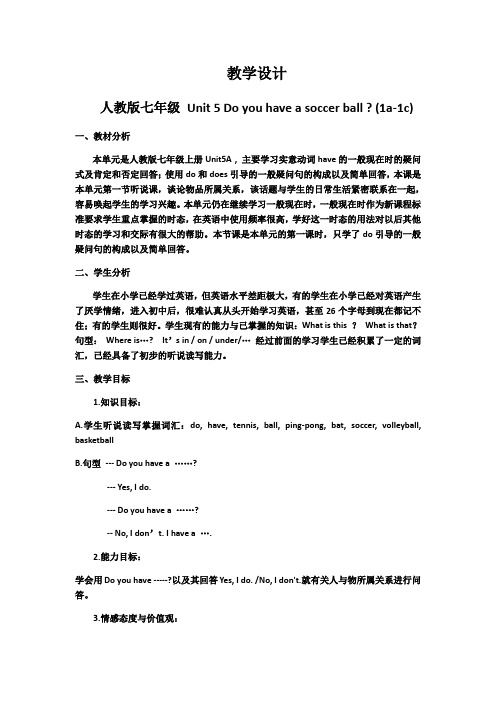
教学设计人教版七年级Unit 5 Do you have a soccer ball ? (1a-1c) 一、教材分析本单元是人教版七年级上册Unit5A , 主要学习实意动词have的一般现在时的疑问式及肯定和否定回答;使用do和does引导的一般疑问句的构成以及简单回答,本课是本单元第一节听说课,谈论物品所属关系,该话题与学生的日常生活紧密联系在一起,容易唤起学生的学习兴趣。
本单元仍在继续学习一般现在时,一般现在时作为新课程标准要求学生重点掌握的时态,在英语中使用频率很高,学好这一时态的用法对以后其他时态的学习和交际有很大的帮助。
本节课是本单元的第一课时,只学了do引导的一般疑问句的构成以及简单回答。
二、学生分析学生在小学已经学过英语,但英语水平差距极大,有的学生在小学已经对英语产生了厌学情绪,进入初中后,很难认真从头开始学习英语,甚至26个字母到现在都记不住;有的学生则很好。
学生现有的能力与已掌握的知识:What is this ?What is that?句型:Where is…? It’s in / on / under/…经过前面的学习学生已经积累了一定的词汇,已经具备了初步的听说读写能力。
三、教学目标1.知识目标:A.学生听说读写掌握词汇:do, have, tennis, ball, ping-pong, bat, soccer, volleyball, basketballB.句型--- Do you have a ……?--- Yes, I do.--- Do you have a ……?-- No, I don’t. I have a ….2.能力目标:学会用Do you have -----?以及其回答Yes, I do. /No, I don't.就有关人与物所属关系进行问答。
3.情感态度与价值观:A热爱体育活动,培养适合自己的体育爱好,锻炼身体。
B.在小组活动中,培养学生团结协作精神。
人教版七年级上Unit5 Do you have a soccer ball知识点归纳
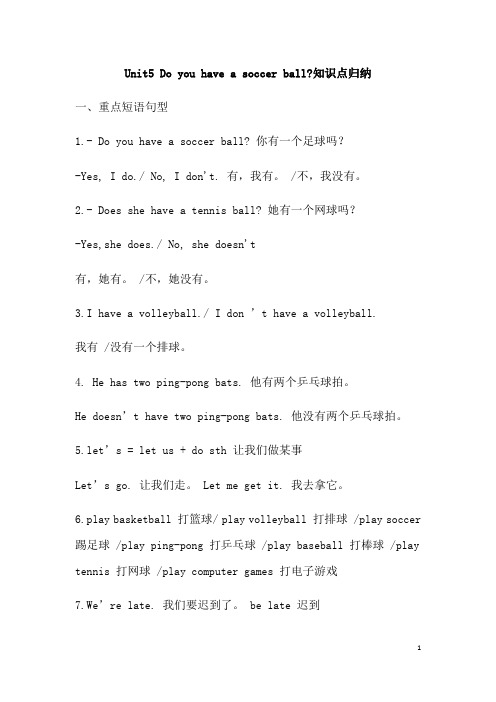
Unit5 Do you have a soccer ball?知识点归纳一、重点短语句型1.- Do you have a soccer ball? 你有一个足球吗?-Yes, I do./ No, I don't. 有,我有。
/不,我没有。
2.- Does she have a tennis ball? 她有一个网球吗?-Yes,she does./ No, she doesn't有,她有。
/不,她没有。
3.I have a volleyball./ I don ’t have a volleyball.我有 /没有一个排球。
4. He has two ping-pong bats. 他有两个乒乓球拍。
He doesn’t have two ping-pong bats. 他没有两个乒乓球拍。
5.let’s = let us + do sth 让我们做某事Let’s go. 让我们走。
Let me get it. 我去拿它。
6.play basketball 打篮球/ play volleyball 打排球 /play soccer 踢足球 /play ping-pong 打乒乓球 /play baseball 打棒球 /play tennis 打网球 /play computer games 打电子游戏7.We’re late. 我们要迟到了。
be late 迟到8.That sounds good. 那听起来很不错。
That sounds interesting/fun/relaxing/boring/difficult. 那听起来很有趣 /放松 /无聊 /困难。
9.watch TV 看电视10.play sports with our classmates 和我的同学做运动11.go to the same school 去同一间学校上学。
12.at school 在学校13.only watch them on TV 只在电视上看它们14.It ’s adj(形容词) for sb.对某人来时怎么样。
人教版英语七年级上册Unit-5--do-you-have-a-soccer-ball

人教版英语七年级上册Unit 5 Do you have a soccer ball?单元教材分析本单元主要学习动词have的一般现在时的用法;使用do和does引导的一般疑问句的构成以及简单回答。
本单元围绕“和朋友一起欢度时光”这一话题安排了三个任务:一是列举所学的运动项目,从中挑选出各自喜欢的体育项目,并说明原因,目的是巩固并新学一些体育项目的名词;二是让学生互相询问所爱好的运动,并根据情况发出邀请,学会用have对物品的所属进行提问与回答,掌握用do和does引导的一般疑问句的构成及使用,了解用Let’s 提建议的句型;三是写作,把任务一、二的完成情况写成日记,进一步复习、巩固所学的语言目标。
通过本单元的学习,学会用have对物品的所属进行提问与回答;学会用let’s…句型提建议;能够谈论自己喜欢哪些球类运动,不喜欢哪些球类运动及原因;能够谈论怎样和自己的朋友度过一段愉快的时光。
单元总体目标.1. 在询问对方是否有某物的对话中学会使用do和does引导的一般疑问句。
2. 学会使用描述性的形容词来评价事物。
3. 学会在对话中使用名词复数。
4. 学会用祈使句来向对方提出建议。
5. 学会用祈使句询问某人是否有某物。
6. 学会向他人提出建议的句子。
7. 学习了解一般现在时。
8. 在本单元中,通过阅读有关运动的文章和对话,使学生更加热爱体育活动并培养一种适合自己的体育爱好。
9.在小组活动中,培养学生团结协作精神。
单元重难点一览表本单元的主题是使用have对物品的所属进行提问及回答,以掌握行为动词在一般现在时中的构成和使用;同时引导学生使用所学的句型谈论自己在球类运动中的喜好。
行为动词在一般现在时的肯定句、否定句和一般疑问句中的构成和使用是初中英语教学中非常重要的内容,本单元知识的掌握程度将直接影响今后的英语学习。
学生在以前的学习中已经掌握了be动词在一般现在时中的构成和使用,在学生的头脑中也已经形成了一个模式,这种模式将直接影响学生对本单元知识内容的接受,所以教师在教学中一定要善于引导,以免学生养成不良习惯。
人教新目标七年级上册英语Unit 5 Do you have a soccer ball知识点汇总

人教新目标七年级上册英语Unit 5 Do you have a soccer ball?知识点汇总第一课时:Section A ---Grammar focus.一、重点词汇:1. have v. 有(用于第一人称(I,we),第二人称(you),以及第三人称复数(they或其他复数名词等);has用于第三人称单数(he,she,it或单数名词)。
如:I/ We/ You/ They/ The boys have an orange. 我有一个橘子。
He/ She / It/ Tom has a Chinese friend. 汤姆有一位中国朋友。
2. tennis n.网球3. volleyball n.排球4. basketball n. 篮球*5. ping-pong bat 乒乓球拍tennis bat 网球拍*6. play v. 名词为:player 指队员,play 后加球类、棋牌类。
E.g.: play soccer/ chess.*7.do v. 实意动词,又称行为动词,意为“做”,例如:do homework; 单三为does,do 又可作为助动词,帮助实意动词构成疑问句或否定句,主语第三人称单数时,用does.二、重点词组:1. play basketball / soccer / tennis / ping-pong 打篮球/ 踢足/ 网球/打乒乓球/打排球;常与play搭配的动词短语还有:play cards打牌play chess 下象棋,中间不加the;*而表示“弹钢琴、拉小提琴”等乐器前,一定要加上定冠词the,其结构为:play +the +乐器。
如:play the piano弹钢琴play the flute吹笛子play the violin拉小提琴;*play with “玩……”,如:The boys are playing with the ball.2. play computer games 玩电脑游戏*3. ping-pong bat 乒乓球拍tennis bat 网球拍三、重点句型及句子:Do you have a ping-pong bat? Yes, I do. / No, I don’t.这是一个一般现在时的一般疑问句,其肯定句为I have a ping-pong ball. 其中,have为实意动词,意为“有”。
人教版英语七年级上册 Unit 5 Do you have a soccer ball_

Period 1(SectionA1a-2c)
Sentences Sports things
Do you have a…?soccer ball ping-pong ball
Yes, I do. /No I don’t.basketball ping-pong bat
5. Let Ss do the pair work according to the chart.
4.Do the listening,writing and reading practice.
5.Make conversations in pairs.
Consolidation
1.Let Ss practice the conversation : Does he/she have a/an… ?.Yes,he/she does./No, he/she does’t.
2.Tell Ss. to do the groupwork.
1.Practice making
conversations :Doeshe/she
have a/an… ?Yes,he/she does./No, he/she does’t.
2.Do some exercises.
3.Ss.work in groups to talk about the ownership in the room.
设计主题
Unit 5 Do you have a soccer ball?
Period 1 Section A 1a-2c
1.教学
内容
1)Words & expressions: have, soccer ball, tennis, racket, tennis racket, ping–pong, volleyball, basketball, bat.
人教英语七上:Unit 5 Do you have a soccer ball 知识讲解与练习
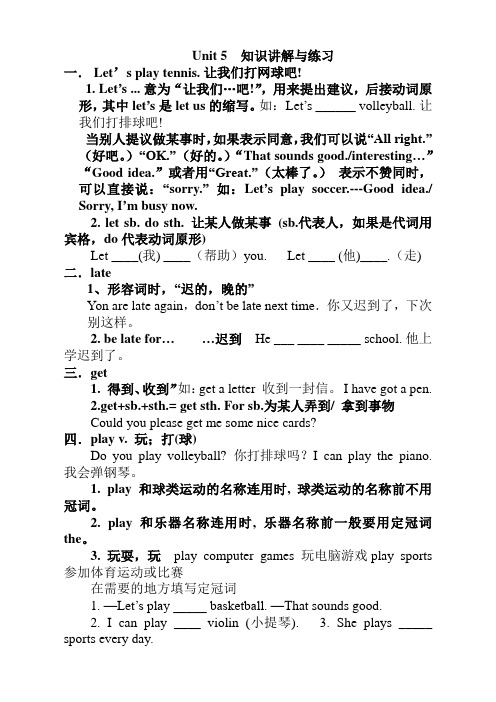
Unit 5 知识讲解与练习一. Let’s play tennis. 让我们打网球吧!1. Let’s ... 意为“让我们…吧!”,用来提出建议,后接动词原形,其中let’s是 let us的缩写。
如: Let’s ______ volleyball. 让我们打排球吧!当别人提议做某事时,如果表示同意,我们可以说“All right.”(好吧。
)“OK.”(好的。
)“That sounds good./interesting…”“Good idea.”或者用“Great.”(太棒了。
)表示不赞同时,可以直接说:“sorry.”如:Let’s play soccer.---Good idea./ Sorry, I’m busy now.2. let sb. do sth. 让某人做某事(sb.代表人,如果是代词用宾格,do代表动词原形)Let ____(我) ____(帮助)you. Let ____ (他)____.(走) 二.late1、形容词时,“迟的,晚的”Yon are late again,don’t be late next time.你又迟到了,下次别这样。
2. be late for……迟到He ___ ____ _____ school. 他上学迟到了。
三.get1. 得到、收到”如:get a letter 收到一封信。
I have got a pen.2.get+sb.+sth.= get sth. For sb.为某人弄到/ 拿到事物Could you please get me some nice cards?四.play v. 玩;打(球)Do you play volleyball? 你打排球吗?I can play the piano. 我会弹钢琴。
1. play和球类运动的名称连用时, 球类运动的名称前不用冠词。
2. play和乐器名称连用时, 乐器名称前一般要用定冠词the。
七年级英语上册《Unit 5 Do you have a soccer ball》知识点 (新版)人教版

Unit 5 Do you have a soccer ball?1. Do you have......? Yes, I do. No, I don’t..你有……吗?是的,我有。
不,我没有。
Do they have......? Yes, they do. No, they don’t..Does he have......? Yes, he does. No, he doesn’t.Does she have......? Yes, she does. No, she doesn’t.在一般现在时中,句子的谓语动词若是实义动词,常借助助动词do或does来构成否定句或疑问句。
Does用于主语是第三人称单数的句子中,其他情况用do。
2. do/does1)作助动词,帮助构成一般现在时的否定句或疑问句,无意义。
Do you have a soccer ball? 你有足球吗?I don’t know. 我不知道。
Does Jim have a sister? 吉姆有妹妹吗?What does he like? 他喜欢什么?He doesn’t like English. 他不喜欢英语。
2) 作实义动词,“做,干”。
I do my homework every day. 我每天都做家庭作业。
Bob does his homework every day. 鲍勃每天都做家庭作业。
3) 在一般现在时中,do/does 可用来替代上文出现过的动词,以避免重复。
Do you have a soccer ball? 你有足球吗?Yes, I do. 是的,我有。
(do 代have)Does she have an eraser? Yes, she does.I don’t have a soccer ball, but my brother Alan d oes.我没有足球,但我的哥哥艾伦有。
3.Let’s do sth. “(让)我们做某事吧。
人教版七年级上册英语讲义 Unit 5 Do you have a soccer ball

Unit5 Do you have a soccer ball?讲义一、【重点单词】do /du:/助动词,帮助构成一般现在时的否定句或疑问句,无意义;实义动词“做,干”have /hæv/有tennis /'tenɪs/网球ball /bɔ:l/球ping-pong乒乓球bat /bæt/球棒;球拍soccer /'sɑ:kər/,/'sɒkə/(英式)足球soccer ball(英式)足球volleyball /'vɒlɪbɔ:l/排球basketball /'bɑ:skɪtbɔ:l/篮球let /let/允许;让us /ʌs/ (we的宾格)我们let's = let us让我们(一起)go /ɡəʊ/去;走we /wi:/我们late /leɪt/迟到has /hæz/有(have的第三人称单数形式)get /ɡet/去取(或带来);得到great /ɡreɪt/美妙的;伟大的play /pleɪ/参加(比赛或运动);玩耍sound /saʊnd/听起来好像interesting /'ɪntrəstɪŋ/有趣的;使人快乐的;乐趣;快乐difficult /'dɪfɪkəlt/困难的relaxing /rɪ'læksɪŋ/轻松的;令人放松的watch /wɒʧ/注视;观看TV /,ti:'vi:/电视same /seɪm/相同的love /lʌv/爱;喜爱with /wɪð/和...在一起;带有;使用sport /spɔ:(r)t/体育运动them /ðem/ /ðəm/他(她、它)们only /'əʊnlɪ/只;仅like /laɪk/喜欢;喜爱easy /'i:zi/容易的;不费力的after /'ɑ:ftə/在...之后class /klɑ:s/班级;课classmate /'klɑ:smeɪt/同班同学二、【重点短语】1. have a volleyball 有一个排球2. play volleyball/tennis 打排球/网球3. have a ping-pong/table tennis 有一个乒乓球4. play ping-pong/table tennis 打乒乓球5. with our friends 和我们的朋友一起6. have a football/soccer ball 有一个足球7. play football/soccer 踢足球8. at school 在校,在上学9. play sports 做运动10. play computer games 玩电脑游戏11. watch TV 看电视12. in the same school 在同一所学校13. after class 下课后14. go to school 去上学三、【重点句型】1. —Do you have a ping-pong bat? 你有一个乒乓球拍吗?—No, I don’t. 不,我没有。
人教七年级上册英语Unit 5 Do you have a soccer ball? 基础知识手册

人教七年级上册英语Unit 5 Do you have a soccer ball?用法集萃1. (That/ it) sounds interesting(fun)/good/difficult/boring/relaxing.那听起来很有趣/好/困难/无聊/轻松。
系动词+ adj.系动词:be; look; sound; smell; taste; feel; get; become2. It’s easy for me.这对我来说挺容易的。
Sth. be + adj. for sb. ……对于某人来说怎么样.for的用法1)供……用,给……的Is this apple for me? 这个苹果是给我的吗?Here is a letter for your mother. 这儿有你妈妈的一封信。
2)作……用(表用途)Do you need bags for sports? 你需要运动包吗?I need a cup for milk. 我需要一个装牛奶的杯子。
3)就……而言,对于……来说For lunch, I like hamburgers and salad. 午饭我喜欢汉堡和沙拉。
For girls, we have T-shirts in all colors.女孩子们可以买到各种颜色的T恤衫。
4)以……的价格(表交换、价格)You can buy socks for only 5 dollars each.你可以买到每双只卖5美元的袜子。
5)for oneself 亲自; 如: Come and see for yourself.你亲自来看看吧。
3. let sb. do sth. 让…做…Let’s do sth 让我们做某事吧。
”表示建议。
(let’s = let us)肯定回答一般用:That sounds good.(那听起来很好)/OK.好的/ All right.好的/ Great.好极了/ Good idea. 好主意否定回答一般用: sorry, I …重点句子点拨:1. That sounds interesting.那听上去很有趣。
人教版英语七年级上册Unit_5_Do_you_have_a__soccer_ball教材全解及单元

人教版英语七年级上册Unit 5 Do you have a soccer ball?教材全解及单元测试卷【教材内容解析】Section A1.soccer ball (P. 25)soccer ball表示“(英式)足球”。
I have a soccer ball.2.Do you have a ping pong bat? (P. 25)have用作及物动词,表示“有、拥有”,强调某人拥有某物。
I have a sister.He has a watch.3.Hey, Helen, let’s go! (P. 26)let’s do sth.意为“咱们做某事吧”,用于提出建议或者请求对方同自己一起做某事,肯定回答用OK, All right, That sounds great, Good idea等,否定回答用Sorry, I...。
---Let’s play basketball.---OK.【拓展】let’s包括说话者和听话双方;let us只包括说话者一方。
Let’s do our homework.Please, sir, let us go now.4.We’re late! (P. 26)late用作形容词,表示“迟到、晚的”,be late for表示“……迟到”。
I am never late for school.【拓展】late还可以用作副词,表示“迟地、晚地”。
Today he gets up late.5. Let me get it. (P. 26)get用作及物动词,意为“取、得到”。
We must open the door and get the ball.Can you get a banana for me?6.Well, let’s play basketball. (P. 27)play此处用作及物动词,意为“参加踢/打(球)”,后接球类名词时,前不用冠词。
人教版七年级上册英语Unit5 Do you have a soccer ball单元语法聚焦

Do
have
• 2.He has a computer.(改为一般疑问句)
• Does he have a computer? • 3.She has a tape player.(改为否定句)
• She doesn’thave a tape player.
• 4.Doe she plays ports everyday? (作肯定回答)
• —No,they
d. on’t
• Ⅱ.单项选择。
( D ) 1.—Who plays soccer well?
—Eric
.
A.is B.do C.plays D.does
( C ) 2. —Does Alice have a tennis bat?
—
.
A.Yes, she is
B.No, she isn’t
• —No,thDeyoes .
• 3.—
he hadvoeesa tennis ball?
• —Yes, he .
• 4.—
DAnoneas have a ping-pong bat?
• —No, she doe. sn’t
• 5.—
MDioke and Eric have any balls?
• Do you have a bike? 你有自行车吗?
• Does Tom have a bike? 汤姆有自行车吗?
• 二、语法专练
• Ⅰ.用do,does,don’t,doesn’t填空。
• 1.— Dyoou have a TV?
do
• —Yes, I .
Do
• 2.—
they hdaoven’a ctomputer?
人教版英语七年级上册 Unit 5 Do you have a soccer ball

➢ Make conversations with your partner.
Does he have a … ? Yes, he does. No, he doesn’t .
➢ Make conversations with your partner.
Does it have a … ?
➢ There is a bike in the yard. 院子里有一辆自行车。
basketball ping-pong ball baseball soccer ball tennis ball volleyball ping-pong bat baseball bat
LLooookkaat tththeefsioterhucsiotrrtdnphdipcpipticucitcrtuuetru,reerw,e,w,ewweceaeccnacanasnensseeseeteehetrtwwetweooogbbiborolyoysys.s.s.WW.WWhhhaahat’tats’’tss’tshtthhetehegebbirboolyo’ys’y’ss’s nnaammeeiononntthhteheemririgidghdhtl?te??
Yes, it does. No, it doesn’t.
ping-pong soccer volleyball baseball tennis ball basketball
ball
ball
I
...
... ...
In my group,I have a… ... has a… ... has a …and... ... That’s all. Thank you.
七年级英语上册 Unit 5 Do you have a soccer ball讲义 (新版)人教新
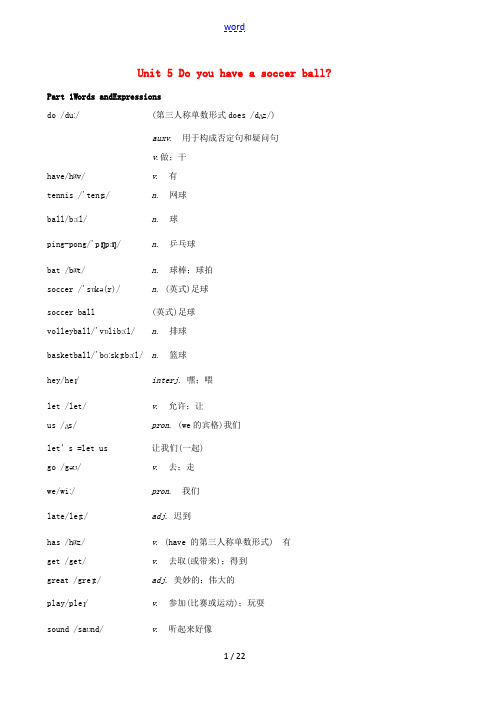
Unit 5 Do you have a soccer ball? Part 1Words andExpressionsdo /duː/ (第三人称单数形式does /dʌz/)auxv. 用于构成否定句和疑问句v.做;干have/hæv/ v. 有tennis /'tenɪs/ n. 网球ball/bɔːl/ n. 球ping-pong/'pɪŋpɔŋ/ n. 乒乓球bat /bæt/ n. 球棒;球拍soccer /'sɒkə(r)/ n. (英式)足球soccer ball (英式)足球volleyball/'vɒlibɔːl/ n. 排球basketball/'bɑːskɪtbɔːl/ n. 篮球hey/heɪ/ interj. 嘿;喂let /let/ v. 允许;让us /ʌs/ pron. (we的宾格)我们let’s =let us 让我们(一起)go /gəʊ/ v. 去;走we/wiː/ pron. 我们late/leɪt/ adj. 迟到has /hæz/ v. (have 的第三人称单数形式) 有get /get/ v. 去取(或带来);得到great /greɪt/ adj. 美妙的;伟大的play/pleɪ/ v. 参加(比赛或运动);玩耍sound /saʊnd/ v. 听起来好像interesting/'ɪntrəstɪŋ/ adj. 有趣的boring/'bɔːrɪŋ/ adj. 没趣的;令人厌倦的fun /fʌn/ adj. 有趣的;使人快乐的n. 乐趣;快乐difficult/'dɪfɪkəlt/ adj. 困难的relaxing/rɪ'læksɪŋ/ adj. 轻松的;令人放松的watch /wɒtʃ/ v. 注视;观看TV/,tiː'viː/ n. (=television /'telɪvɪʒn/)电视;电视机watchTV 看电视same /seɪm/ adj. 相同的love /lʌv/ v.&n. 爱;喜爱with /wɪð/ prep. 和……在一起;带有;使用sport /spɔː(r)t/ n. 体育运动them /ðəm/ pron. (they的宾格) 他(她、它)们only/'əʊnli/ adv. 只;仅like/laɪk/ v. 喜欢;喜爱easy/'iːzi/ adj. 容易的;不费力的after /'ɑːftə(r)/ prep.&conj. 在……之后class /klɑːs/ n. 班级;课classmate/'klɑːsmeɪt/ n. 同班同学Bill /bɪl/ 比尔(男名)Part 2:Texts课文(一)Cindy: Hey, Helen, let’sgo!We’relate!Helen: OK.Cindy: Doyou havethe baseball?Helen: Yes,Ido.It’s in mybag.Cindy: And where’s our baseballbat?Helen: Billhas it.Cindy: Oh,yeah.And doyou haveyour jacket? Helen:Oh, no,Idon’t.It’s on the chair.Let megetit. Cindy: Andyour hat, too!Helen: OK,Ihavemyjacket and hat.Let’sgo!Structure1. Doyou haveabaseball?Yes,Ido./No,Idon’t.Ihaveavolleyball.2. Doyou haveaping-pongbat?Yes,Ido./No,Idon’t. Ihaveaping-pongball.3. Does she haveatennisball?Yes, she does./No, shedoesn’t. Shehas a baseball. 4. Does he haveasoccerball?Yes, hedoes./No. hedoesn’t. Hehas two ping-pongbats.5. Do theyhaveabasketball?Yes, theydo./No, theydon’t.Theyhaveavolleyball.don’t = do not doesn’t = does not句型:—Do/Does sb. have…?—Yes, sb. do /does.—No, sb. don’t /doesn’t.Write eachword inthe correct placeinthe chart.将方框中的单词填入表格中正确的位置。
人教版英语七上Unit 5 Do you have a soccer ball

Match the words with the things in the picture.
a ___ 2.ping-pong bat ___f 1.tennis ball 3.soccer ball
4.volleyball
5.basketball
___c ___e
d ___ 6.baseball bat ___b
ping-pong bat
tennis racketL Nhomakorabeaarning
• • • • • • • • • soccer ball 英式足球 basketball 篮球 volleyball 排球 baseball 棒球 baseball bat 棒球棒 ping-pong ball 乒乓球 ping-pong bat 乒乓球拍 tennis 网球 tennis racket 网球拍
Helen
Cindy
2d Read the conversation and answer the questions.
1. Where is the baseball ? It’s in Helen’s bag. 2. Who has the baseball bat ? Bill has it. 3.Where is Helen’s jacket ? It’s on the chair. 4. Does Helen have a hat ? Yes, she does.
--What’s this in English? --It’s a ….
basketball soccer ball
baseball bat
volleyball
baseball
--What’s this in English? -- It’s a ….
人教版七年级上册英语Unit 5 Do you have a soccer ball
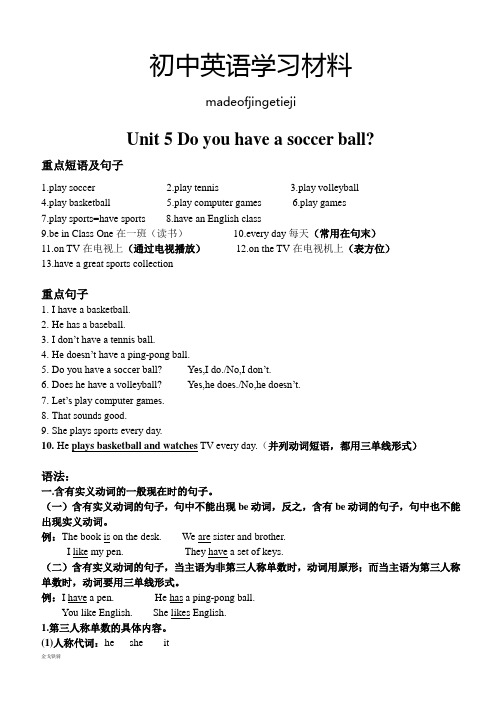
初中英语学习材料madeofjingetiejiUnit 5 Do you have a soccer ball?重点短语及句子1.play soccer2.play tennis3.play volleyball4.play basketball5.play computer games6.play games7.play sports=have sports 8.have an English class9.be in Class One在一班(读书)10.every day每天(常用在句末)11.on TV在电视上(通过电视播放)12.on the TV在电视机上(表方位)13.have a great sports collection重点句子1.I have a basketball.2.He has a baseball.3.I don’t have a tennis ball.4.He doesn’t h ave a ping-pong ball.5.Do you have a soccer ball? Yes,I do./No,I don’t.6.Does he have a volleyball? Yes,he does./No,he doesn’t.7.Let’s play computer games.8.That sounds good.9.She plays sports every day.10.He plays basketball and watches TV every day.(并列动词短语,都用三单线形式)语法:一.含有实义动词的一般现在时的句子。
(一)含有实义动词的句子,句中不能出现be动词,反之,含有be动词的句子,句中也不能出现实义动词。
例:The book is on the desk. We are sister and brother.I like my pen. They have a set of keys.(二)含有实义动词的句子,当主语为非第三人称单数时,动词用原形;而当主语为第三人称单数时,动词要用三单线形式。
【人教版】七年级英语上册: Unit 5 Do you have a soccer ball 含答案
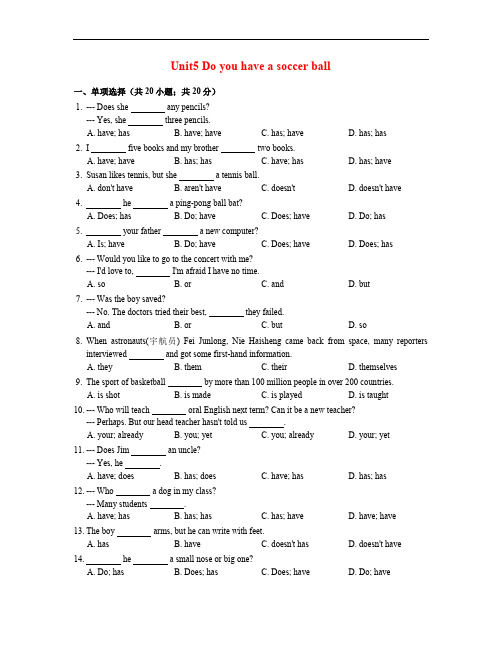
Unit5 Do you have a soccer ball一、单项选择(共20小题;共20分)1. --- Does she any pencils?--- Yes, she three pencils.A. have; hasB. have; haveC. has; haveD. has; has2. I five books and my brother two books.A. have; haveB. has; hasC. have; hasD. has; have3. Susan likes tennis, but she a tennis ball.A. don't haveB. aren't haveC. doesn'tD. doesn't have4. he a ping-pong ball bat?A. Does; hasB. Do; haveC. Does; haveD. Do; has5. your father a new computer?A. Is; haveB. Do; haveC. Does; haveD. Does; has6. --- Would you like to go to the concert with me?--- I'd love to, I'm afraid I have no time.A. soB. orC. andD. but7. --- Was the boy saved?--- No. The doctors tried their best, they failed.A. andB. orC. butD. so8. When astronauts(宇航员) Fei Junlong, Nie Haisheng came back from space, many reportersinterviewed and got some first-hand information.A. theyB. themC. theirD. themselves9. The sport of basketball by more than 100 million people in over 200 countries.A. is shotB. is madeC. is playedD. is taught10. --- Who will teach oral English next term? Can it be a new teacher?--- Perhaps. But our head teacher hasn't told us .A. your; alreadyB. you; yetC. you; alreadyD. your; yet11. --- Does Jim an uncle?--- Yes, he .A. have; doesB. has; doesC. have; hasD. has; has12. --- Who a dog in my class?--- Many students .A. have; hasB. has; hasC. has; haveD. have; have13. The boy arms, but he can write with feet.A. hasB. haveC. doesn't hasD. doesn't have14. he a small nose or big one?A. Do; hasB. Does; hasC. Does; haveD. Do; have15. --- your mother a computer?--- Yes, she does .A. Does; hasB. Do; haveC. Does; haveD. Is; have16. --- Dad, would you like to play chess with me?--- Well, my dear, I'd love to, I have to write a report.A. forB. andC. butD. or17. I'd like to go shopping with you, I'm too busy today.A. butB. andC. soD. or18. --- I don't like the color of this pair of shoes.--- Come on. .A. Try them onB. Try on themC. Try it onD. Try on it19. I will do my homework at home instead of basketball.A. playB. playedC. playingD. to play20. --- Lucy, Miss Wang won't teach English next term.--- What a pity! She often helps us with English.A. us; ourB. our; usC. us; oursD. our; our二、单词拼写(单句首字母填空)(共20小题;共20分)21. She goes to school l (not early).22. Washing the dishes at home every day is very b .23. Tina has o one sister.24. I wore my s shoes for the gym class yesterday.25. He spends his free time w TV programs. He spends his free time o TV programs.26. Kong Linghui is good at playing table t .27. I have two v , and I like playing volleyball with my friends.28. Mr. Zhang is a good teacher. He always makes his classes i .29. I think basketball is not easy. It's d .30. Going to the beach for vacation is r .31. Bob's sister is never l for work.32. There's nothing interesting in today's newspaper. It's too b .33. You have ten yuan, but I have o one yuan.34. She likes walking down the street in the s shoes.35. He usually stays at home and w TV at home.36. Chinese people are very good at table t , and it's our favorite sport.37. They often play v after school.38. It is i to play with pets. It can make us happy.39. Math(数学) is very d for me, so I don't like it.40. I like my job, because it's r .三、单词拼写(根据中文提示拼写单词)(共20小题;共20分)41. Mrs. Gao always comes home (迟) than her husband.42. The music (听起来) like birds singing.43. We are in the (同样的) class.44. My (同学们) are going to climb the mountain at (任何时间) next week.45. Tom likes playing (排球) very much.46. --- Let's play music.--- That sounds (轻松).47. I think this book is very easy and that book is very (困难的).48. They are talking about an (有趣的) film.49. --- Does he have a bat?--- Yes, he (仅仅) has one.50. They are watching a (网球) match on TV.51. He is a waiter and often works (晚).52. This piece of music (听起来) funny.53. Cindy has the (相同) handbag as I do.54. Sun Li is in Class Two. I'm in Class Two, too. We are (同班同学).55. Two (排球) are under Tom's bed.56. I like light music because it is (令人放松的).57. It was (困难的) to find the lost dog.58. This is a(n) (有趣的) game.59. The Greens have o (仅) one daughter.60. He is my favourite (网球) player.四、完形填空(共10小题;共15分)Rose 61 a sister 62 a brother. Her sister is Helen and her brother is Paul. Rose and Helen can 63 . Rose can sing and play 64 , but Helen 65 . Helen 66 chess, but she 67 play chess with Rose. She plays chess 68 Paul. Paul can also play 69 . They get on well (相处得融洽) with each other. They love 70 family.61. A. has B. have C. is62. A. or B. but C. and63. A. dances B. dancing C. dance64. A. the guitar B. a guitar C. guitar65. A. can B. can't C. don't66. A. to like B. like C. likes67. A. doesn't B. isn't C. don't68. A. to B. on C. with69. A. basketball B. the basketball C. basketballs70. A. his B. her C. their五、阅读理解(共20小题;共40分)AHello, everyone! My name is Bob. I have a good friend. His name is Paul. He is a yellow dog. I like him very much.Every morning Paul runs with me, and we play in the park every afternoon. Paul is very fat. He likes eating beef hamburgers for breakfast. For dinner, he likes fish. Paul likes red. He has two red hats. Look! They are on my bed.But Paul is lost now. Please help me. My telephone number is 3123216. My email address is paul2013@. Many thanks!71. Paul is .A. Bob's brotherB. a dogC. Bob's classmateD. a cat72. Paul every morning.A. runs with BobB. plays with hatsC. eats hamburgersD. watches TV73. Paul's hats are on the .A. deskB. chairC. bedD. wall74. Which of the following is NOT true according to the passage?A. Paul is Bob's friend.B. Bob's telephone number is 3123216.C. Paul has two red hats.D. Bob likes eating beef hamburgers and fish.75. Bob writes the passage to .A. thank PaulB. introduce(介绍) PaulC. ask for helpD. show his loveBMy name is Amanda. I get many presents on my birthday. Do you want to have a look?I like collecting(收集) different kinds of watches. My aunt buys this red watch for me in Hong Kong. I love cars very much. My father is so nice. He knows me well. This blue model(模型) car is from him. He buys it in Canada. My sister gives me this pair of yellow trainers. Blue is my favourite colour, but I like the trainers very much. The two books are from my friends Joy and Christina. We like reading very much. After school we always go to the library to read books.76. Who gives a watch to Amanda?A. Her sister.B. Her father.C. Her friends.D. Her aunt.77. Amanda doesn't get on her birthday.A. a watchB. a model carC. a pair of jeans(牛仔裤)D. two books78. What colour does Amanda like best(最喜欢)?A. Red.B. Yellow.C. Orange.D. Blue.79. Where may(可能) you see Amanda after school?A. In the library.B. In the classroom.C. On the playground.D. In the lab.80. What's the best title(标题) for this passage?A. My Birthday PartyB. My Birthday PresentsC. My Good FriendsD. My Big FamilyCI'm Jim. Daming, Betty and I are good friends. We are in the same grade. They are in Class One, and I am in Class Two. We get up at seven o'clock and then go to school. They have English at ten o'clock in the morning and I have it at two o'clock in the afternoon. English is my favourite lesson. They like Chinese very much. But we all like having PE.In the afternoon, at half past two we have the art lesson in the same classroom. After that we often play football in the playground. We all like football. Sometimes we play computer games at my home. We don't watch TV. We do our homework at Daming's home.81. Daming, Betty and Jim are in the same .A. classB. houseC. schoolD. family82. They have the lesson in the same classroom.A. EnglishB. ChineseC. mathsD. art83. All of them like very much.A. mathsB. PEC. scienceD. English84. They play computer games .A. at Betty's homeB. at Daming's homeC. at Jim's homeD. at school85. They do their homework .A. at Daming's homeB. at Jim's homeC. at Betty's homeD. at schoolDTickets(门票) for the NBA basketball game are going on sale (出售). Lots of people like to go to watch basketball. Most of them are going to cheer(欢呼) for their teams. However(无论如何), there are never enough tickets for everyone. So some people come the day before and sleep in front of the ticket office. At night, when they are waiting, some people play music, others dance and sing, and still others talk about their favorite players. Sometimes they argue(争论) because they like different teams. After waiting all night to buy tickets, they will be too tired to enjoy the game.86. Why do many people like to go to basketball games?A. It's easy to buy ticketsB. They like to see their favourite teams playC. They have free ticketsD. They live near the basketball court87. Why is it hard(困难的) to buy tickets?A. The ticket office is far awayB. The tickets are very expensiveC. There aren't enough tickets for everyoneD. There are too many tickets88. What do some people do to buy them?A. Go to the ticket office right before the gameB. Ask a basketball player for helpC. Pay by credit cardD. Wait in front of the ticket office89. What do they do when they are waiting for the ticket office to open?A. Sing, dance, and talkB. Play basketballC. Cheer for their teamsD. Go on sale90. Which is the best title(题目)?A. Waiting to Buy TicketsB. NBA Basketball GameC. Tickets OfficeD. Tickets on Sale六、阅读与表达(判断式)(共5小题;共10分)David and his brother Grey don't go to school in the morning. They go to school after lunch, at one o'clock. They have math at one-fifteen, David likes math because it's interesting. Greg doesn't like math. David and Greg have P.E. after math. They like the teacher, Mr. Green and they like P.E. because it's fun. But Greg's favorite subject is art and David's favorite is music. He plays the piano and the violin.根据短文内容,判断正误,正确的为T,错误的为F。
- 1、下载文档前请自行甄别文档内容的完整性,平台不提供额外的编辑、内容补充、找答案等附加服务。
- 2、"仅部分预览"的文档,不可在线预览部分如存在完整性等问题,可反馈申请退款(可完整预览的文档不适用该条件!)。
- 3、如文档侵犯您的权益,请联系客服反馈,我们会尽快为您处理(人工客服工作时间:9:00-18:30)。
七年级英语(含教案和练习)Unit 5 Do you have a soccer ball一、学习目标:1. —Do you/ they have a soccer ball? —Yes, we/they do. /No, we/they don’t.2. Does she/he have a tennis racket? —Yes, she/he does. / No, she/he doesn’t.3. Let’s play volleyball!4. That sounds good/ interesting /fun/ boring!能力目标Talk about ownership. 谈论物主关系Make suggestions. 提出建议二、重点、难点重点1. 单词:play, sound , good, interesting, boring, difficult, fun, many, much, some2. 句型:Have … Let’s …难点一般现在时三、知能提升:(一)【重点单词】[单词学习]1. play [plei]与不同的词搭配表示不同的意思。
【用法1】vt. 玩(游戏);打(球);踢(球)【考点】与play 搭配使用时,球类名词前不加冠词【例句】play football 踢足球play basketball/ table tennis 打篮球/乒乓球【用法2】vt. 演奏【考点】与play 搭配使用时,乐器类名词前加定冠词the,表示“弹奏……”【例句】play the piano 弹钢琴play the guitar 弹吉他【考题链接】1. I like music. I play _____ violin after school.A. aB. anC. theD. /2. Let’s play ______ basketball together.A. aB. anC. theD. /答案:1. C 2. D解题思路:1. 与play 搭配使用时,乐器类名词前加定冠词the,表示“弹奏……”2. 与play 搭配使用时,球类名词前不加冠词。
2. sound [saund]【用法1】n. 声音,响声【例句】I like the sound of piano. 我喜欢钢琴的声音。
【用法2】v. 听起来连系动词,其后接名词,形容词或介词短语作表语。
【例句1】A: Let’s go to the park.B: That sounds interesting. 那听起来很有趣。
【解析】that指上句所提的建议,英语中指代前面所述的内容或事情,通常用that而不用this。
that属第三人称单数,故谓语动词sound后应加s。
【例句2】A: Do you like M ary’s story? 你喜欢玛丽(所讲)的故事吗?B: No, I don’t like it. The story sounds boring. 不,我不喜欢。
这个故事听起来很乏味。
【辨析】hear vt.听见指听到的结果I can’t hear your voice. 我听不见你的声音。
listen ['lisn]vi. 听指听的动作She's listening to the radio. 她在听广播。
【考题链接】A: I want to play volleyball with my friends. Do you want to come with me?B: Sure. That _____ interesting.A. soundB. soundsC. hearD. hears答案:B解题思路:根据语境含义:那听起来很有趣,可知选B项。
3. good, interesting, boring, difficult, fun【用法】这些形容词主要用在名词前作定语或在系动词后作表语。
She is a good teacher. 她是一个好老师。
This is an interesting book. 这是一本有趣的书。
Playing with Jack is very boring. 和杰克玩很无聊。
It’s a difficult question. I can’t answer it. 这是一个很难的问题。
我答不出来。
I had a fun weekend. 我过了一个有趣的周末。
这些形容词前还可以用副词来修饰。
This is a very interesting book. 这是一本很有趣的书。
I t’s too difficult. 它太难了。
【交际口语】That sounds+形容词。
“那听起来……”(用来表达个人观点)褒义的评价可选用:interesting, fun, relaxing, good, wonderful贬义的评价可选用:boring, terrible, bad【例句1】A: Let’s watch TV.B: That sounds bad. I want to play video games.【解析】sound在这里是连系动词,作“听起来……”讲,其后接一个形容词作表语。
【例句2】Your idea doesn’t sound good. 你的主意听起来好像不行。
【拓展】与sound类似的连系动词还有:look(看起来……,显得……),taste(尝起来……),smell(闻起来……)。
【例句】The song sounds beautiful. 这首歌听起来很优美。
That story sounds very interesting. 这个故事听起来很有趣。
Your watch looks very nice. 你的手表很好看。
【拓展】类似的表达法:look happy看上去很高兴sound like听起来像……look like看起来像……4. many, much, somemany adj. 大量的,许多的【用法】修饰可数名词。
【例句】I have many friends. 我有许多朋友。
much adj. 很多的,大量的【用法】修饰不可数名词。
【例句】There is much water in the bottle. 瓶子里有许多水。
some adj. 一些【用法】既可以修饰可数名词又可以修饰不可数名词【例句】She has some apples and I have some milk. 她有一些苹果,我有一些牛奶。
【考题链接】用many , much 填空A: Look! There are ______ toy cars in the shop.B: They are so cool. But I don’t have _____ money. We c an’t buy them.答案:many; much解题思路:toy car 玩具汽车——可数名词,可用many修饰。
money 钱——不可数名词,可用much修饰。
5. good, well 辨析good adj. 好的【用法】可用在名词前修饰名词,充当定语也可用于连系动词后,作表语。
【例句】Linda is a good girl. 琳达是个好女孩。
This restaurant is very good. 这家饭店很好。
well adv. 很好地;满意地【用法】作副词时,用来修饰形容词,副词或动词,在句子中作状语。
【例句】Do the boys eat well at school? 孩子们在学校吃得好吗?He plays soccer well. 他踢球踢得很好。
[即学即练]1. A: Do you want to play ________ after school?B: Yes, I do.A. basketballB. a basketballC. the basketballD. some basketballs2. I am hungry. I want to eat ______ rice.A. manyB. someC. anyD. a lot3. That _______ a good idea.A. listen toB. soundsC. hearD. listen答案:1. A. 2. B 3. B(二)【重点句型与表达】[句型学习]1. Do you have…?vt. 拥有,占有。
其主语可以指人,也可以指物,其第三人称单数形式为has。
【例句】I have a friend here. 我这儿有个朋友。
She has three dictionaries. 她有三本词典。
This coat has no pockets. 这件衣服没有口袋。
I have a book. It’s my book.You have a dog. It’s your dog.She has a pen. It’s her pen.He has a bike. It’s his bike.We have a TV. It’s our TV.They have a ball. It’s their b all.【考点】Jim and Tom have a computer. 吉姆和汤姆有一台电脑。
(两人共有,主语是复数)Jim has a computer. 吉姆有一台电脑。
【难点】have 有……there be 某地有某物、某人have强调的是拥有或占有,主语一般是名词或代词,其与主语是所属关系。
There is/ are ...表示某处有某物或某人,强调的是一种客观存在。
【例句】I have two brothers and one sister. 我有两个兄弟,一个姐姐。
My sister has two toys but I have one. 我妹妹有两个玩具,而我只有一个。
※有时there be结构和have可互换。
There are twenty classes in our school. =We have twenty classes in our school.我们学校有二十个班级。
【用法2】have vt. 吃,喝【例句】We have lunch at school. 我们在学校吃午饭。
He wants to have a cup of tea. 他想喝杯茶。
【考题链接】用there is , there are, have, has填空。
(1) Does she _____ a brother? No, she doesn’t.(2) Look! ______ a cat under the chair.(3) Mike _____ a ping-pong ball. But he doesn’t have a ping-pong bat.(4) ______ many interesting books at school.答案:1. have 2. There is 3. has 4. There are2. Let’s pla y ping-pong. 让我们打乒乓球吧。
